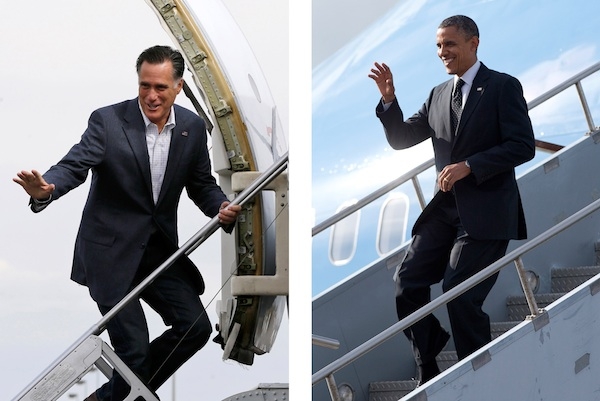Is Barack Obama really as clever as he looks? Ever since he first appeared in the public eye, it’s been taken as read that he’s a major intellectual. Liberals say, in fact, that brilliance is his greatest flaw. He’s too academic, too nuanced; too eager to understand both sides to be an effective leader. The right, meanwhile, regards him as a professorial Marxist, a tenured radical in the White House. Like or hate him, it seems, Barry got brains.
But does he? On Wednesday Obama faced Mitt Romney in the first of the three 2012 presidential election debates. The expectation was that the president, the celebrated rhetorician, would come out on top. Romney is hardly the sharpest tool. But we shouldn’t be too surprised if by the end of the debating season, those high expectations have turned to disappointment.
Obama’s past debate performances have been anything but impressive. Watch him closely during the next two debates, on October 16 and 22. You’ll find he drones on a bit, and is slow to react to his opponent. Yes, he has charm — in the 2008 debates, he just about outsmoothed his adversary John McCain — though most commentators called it a ‘bore draw’. Hillary Clinton, however, regularly outmanoeuvred him earlier that year as they argued over the Democratic nomination. And in 2004, even the mad right-wing autodidact Alan Keyes seemed at times more lucid than Obama in Illinois senatorial election debates.
It’s easy to see where the idea of Obama as a deep thinker comes from. He wrote (we think) those books about dreams and hope. He gives those high-minded speeches about healing America. He talks about theology, Islam and the novels of Marilynne Robinson. He edited the Harvard Law Review, for crying out loud. But what if we’ve all misjudged him? What if is his cool intellectualism is really just a brilliant bluff? Success in this world is no guarantee of merit or talent. Look at Ed Miliband. And while we all know that Obama can sound wonderful with a teleprompter in front of him and a good writer behind, the truth is his words fall flat as often as they soar.
Obama is most comfortable in the role of philosopher president, delivering moderate verdicts against the fringes of popular opinion. He is fond, as so many politicians are, of talking about the need to transcend partisanship and ‘reach across the aisle’. But telling others to ‘agree to disagree’ is a very facile way of sounding wise.
And as we’ll see in these debates, he isn’t great when it comes to thinking on his feet. Faced with a really challenging question, he ducks. When, for instance, Pastor Rick Warren asked him at what point a baby is entitled to human rights, he replied, famously, that such matters were ‘above my pay grade’. Humble, you might think. But odd from a man whose favourite theologian is Reinhold Niebuhr.
Some are reluctant to challenge Obama’s status as an intellectual for fear they might seem racist. But the problem with Obama is that he has the pseudy qualities of the honky American elite: an eagerness to namecheck intellectuals, and a tendency in speech to reach for the highest apple on the rhetoric tree, particularly in the contemplation of his own identity. ‘The only way my life makes sense,’ he told his biographer David Maraniss, ‘is if, regardless of culture, race, religion, tribe, there is this commonality, these essential human truths and passions and hopes and moral precepts that are universal.’ Well, quite.
We all swooned four years ago when the new President called on us to ‘bend the arc of history’ towards justice. What did he mean? Nobody really stopped to think. Everyone was too thrilled to have an American leader who wasn’t George W. Bush.
Clearly, he is a good deal more cerebral than some others on the American political scene — than his vice-president Joe ‘the gaffe machine’ Biden, or Michelle Bachmann, or that sweet man Rick Perry, who can’t remember his own urgent points. But that’s not hard, is it?
Just as Dubya was not as daft as everybody thought, perhaps Obama is not as shrewd. Yet he does have one undoubted talent: the ability always to appear thoughtful without necessarily being so. He can make a platitude sound fresh every time. That’s an invaluable skill in a political campaign, but it is not intelligence.







Comments